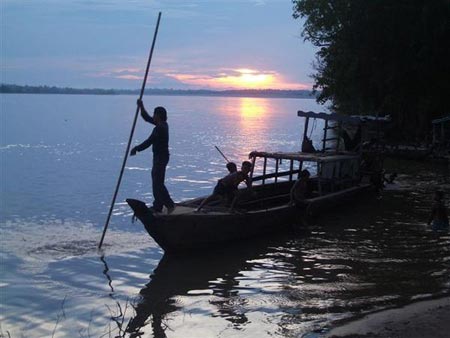Mekong water level is the lowest in 30 years
The Mekong, the big river flowing from China through five Southeast Asian countries, has a low water level for the past 30 years, a Thai official said.

A section of the Mekong River.Photo: odyssei.com .
The weather pattern caused by El Nino phenomenon causes the rainfall in the region to be low, and will be even lower if the supply from the upstream is reduced, Kasemsun Chinnavaso, director of the Thailand Water Resources Authority, said yesterday.
According to Asia News Networks, summer has not yet come but many trees in many forests and near roads along the Mekong are suffering from drought.
The Mekong is one of the longest rivers in the world. Originating from the Tibetan plateau, it flows through Yunnan province of China, Myanmar, Laos, Thailand, Cambodia and Vietnam.
People living along the Mekong River affirm that the river level is extremely low. Water transport activities between China and Thailand are suspended. The fields on both sides of the river continue to wither. Domestic water becomes scarce due to reduced water levels in wells.
Dozens of cities and towns from Chiang Saen district - located on Thailand's northern border - to Pa Dai are badly affected by the decline in the water level of the Mekong. Many people say they see river water rising or falling in meters in a single day. The low water level disrupts the feeding and reproductive activities of animal systems in the Mekong River - where about 70% of fish have seasonal migratory behavior.
People on both sides of the river told The Straits Times that fish production has dropped significantly and that big fish have become scarce. They also affirmed the erratic rise and fall of the water level, making the fields of chilli, vegetables and tobacco along the banks of the river unable to survive.
Some Thai people believe that the cause may be due to upstream dams.
Niwat Roykaew, leader of a conservation organization based in Chiang Khong, Thailand, said last month an official from Chiang Rai city sent a letter to China's Yunnan province leader. In the letter he asked Yunnan authorities to open the dam to overcome the water shortage in the lower Mekong.
In the reply, the head of Yunnan province said he could not follow this request because Yunnan province also needed water for irrigation during the dry season.
China has been accused of controlling the flow of the Mekong since it operated three hydropower dams on the Mekong River in Yunnan Province. These dams have a total water reserve of up to 3 billion cubic meters. The fourth dam, named Tieu Loan, is under construction and will be completed in 2012. With a height of about 300 meters, Xiaowan will become the world's highest dam and capable of holding 15 billion cubic meters of water.

Xiaowan Dam in China.Photo: edu.au.
However, Chinese experts and officials believe that irrigation dams are not the culprits that make the Mekong river water level drop sharply.
China's Assistant Foreign Minister Hu Zheng-yue affirmed to Thai Prime Minister Abhisit Vejjajiva during a meeting in Bangkok on March 8 that dams in Yunnan Province are not related to the water level in the lower Mekong.
"China does not do anything that harms the common interests of its neighbors in the Mekong region ," Hu said.
According to Asia One, Abhisit told Hu that Thai people blamed the Chinese dam because they did not know about the dams.
"China has a huge role in regional development and I believe China also does not want to witness the difficult situation of people living downstream of the Mekong River," Asia One quoted Abhisit.
Thai Foreign Minister Kasit Piromya said that countries downstream of the Mekong should not blame China because the Mekong receives 35% of Laos' rainwater, while Chinese dams hold only 4% of the country's total. river.
China is also suffering from an unusually long drought. People in some localities said that the last rain they witnessed has occurred since October last year.
Tuenjai Deetes, a former Thai senator and conservationist, told The Straits Times that it is time for the countries involved in the Mekong to sign a joint agreement on sharing the river's water resources. 'There is clear evidence that development projects in countries are not interested in cross-border environmental and social impacts. These impacts negatively affect the downstream areas of the Mekong River , "Deetes said.
- China claims not to drain the Mekong
- Thanks to China rescuing the Mekong
- Water of the Red River through Lao Cai shallow record, strong odor
- Climate change scenario: More than 1/3 of the Mekong Delta is flooded
- The largest river water level in the world is a record low
- Many measures to prevent forest fire
- The area of the Arctic ice falls to the lowest level
- Losing 40% of the Mekong Delta if the sea level rises by one meter
- No decision has been made on Lao hydroelectric dam
- It is proposed to postpone the construction of a dam on the Mekong River
- The first summit about the Mekong
- New discovery of the process of forming the Mekong River
 Is the magnetic North Pole shift dangerous to humanity?
Is the magnetic North Pole shift dangerous to humanity? Washington legalizes the recycling of human bodies into fertilizer
Washington legalizes the recycling of human bodies into fertilizer Lightning stone - the mysterious guest
Lightning stone - the mysterious guest Stunned by the mysterious sunset, strange appearance
Stunned by the mysterious sunset, strange appearance